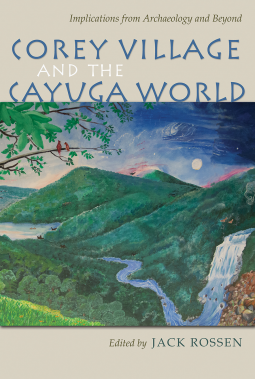Please wait... This may take a moment.
Corey Village and the Cayuga World
Implications from Archaeology and Beyond
This title was previously available on NetGalley and is now archived.
Pub Date
Sep 15 2015
| Archive Date
Jul 14 2015
Description
The Cayuga are one of the original five nations of the Haudenosaunee Confederacy,
a powerful alliance of Native American tribes in the Northeast, inhabiting
much of the land in what is now central New York State. When their
nation was destroyed in the Sullivan–Clinton campaign of 1779, the Cayuga
endured 200 years of displacement. As a result, relatively little is known about
the location, organization, or ambience of their ancestral villages. Perched on
a triangular finger of land against steep cliffs, the sixteenth-century village of
Corey represents a rare source of knowledge about the Cayuga past, transforming
our understanding of how this nation lived.
The Cayuga are one of the original five nations of the Haudenosaunee Confederacy, a powerful alliance of Native American tribes in the Northeast, inhabiting much of the land in what is now central...
Description
The Cayuga are one of the original five nations of the Haudenosaunee Confederacy,
a powerful alliance of Native American tribes in the Northeast, inhabiting
much of the land in what is now central New York State. When their
nation was destroyed in the Sullivan–Clinton campaign of 1779, the Cayuga
endured 200 years of displacement. As a result, relatively little is known about
the location, organization, or ambience of their ancestral villages. Perched on
a triangular finger of land against steep cliffs, the sixteenth-century village of
Corey represents a rare source of knowledge about the Cayuga past, transforming
our understanding of how this nation lived.
A Note From the Publisher
Jack Rossen is professor in the Department of Anthropology at Ithaca College.
Jack Rossen is professor in the Department of Anthropology at Ithaca College.
Advance Praise
"A richly informative historical account of the thriving Cayuga
world through the perspective of the Corey site, a dynamic sixteenth-
century village on the eve of European contact. This study
fills a void as it is the first book published on Cayuga
archaeology."—Jordan E. Kerber, professor of anthropology and Native
American studies, Colgate University
"Rossen well situates the political impact
of archaeological research on contemporary
indigenous communities and realizes
a model for changing the relations between
scholars and the descendants of the
people who lived in the sites they dig."—Kurt Jordan, associate professor of anthropology and
American Indian studies, Cornell University
"A richly informative historical account of the thriving Cayuga world through the perspective of the Corey site, a dynamic sixteenth- century village on the eve of European contact. This study fills...
Advance Praise
"A richly informative historical account of the thriving Cayuga
world through the perspective of the Corey site, a dynamic sixteenth-
century village on the eve of European contact. This study
fills a void as it is the first book published on Cayuga
archaeology."—Jordan E. Kerber, professor of anthropology and Native
American studies, Colgate University
"Rossen well situates the political impact
of archaeological research on contemporary
indigenous communities and realizes
a model for changing the relations between
scholars and the descendants of the
people who lived in the sites they dig."—Kurt Jordan, associate professor of anthropology and
American Indian studies, Cornell University
Available Editions
| EDITION |
Hardcover |
| ISBN |
9780815634058 |
| PRICE |
$39.95 (USD)
|
Additional Information
Available Editions
| EDITION |
Hardcover |
| ISBN |
9780815634058 |
| PRICE |
$39.95 (USD)
|
Average rating from 2 members




